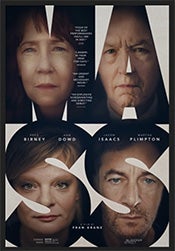“I only got the request from the director two weeks before they started filming,” says Ann Price, lecturer in the Department of Theatre, Film and Creative Writing at Boise State. “When I got the first email from Fran Kranz, he very quickly said who he was, described the project and he mentioned Jason Isaacs. And I thought, ‘wait, that Jason Isaacs?’”

“I couldn’t believe it. This is an amazing opportunity. I don’t think I’ll be able to do it. If I’d had time to think about it, I probably wouldn’t have done it,” she says. “I thought, ‘I’m not really well prepared for this job—I have zero film experience.’ But I moved forward with it, out of my comfort zone. And isn’t that what we ask our students to do?”
Price worked as the dialect coach with Isaacs on the recently released drama film, “Mass,” written and directed by Fran Kranz and now available on streaming platforms. The film stars Reed Birney, Ann Dowd, Jason Isaacs and Martha Plimpton as grieving parents who meet to discuss a tragedy involving their sons. Isaacs, an English actor, is known for his roles in “The Patriot” (2000), “Peter Pan” (2003) and as Lucius Malfoy in the Harry Potter film series. The award-winning film was shot in 2019 in Haley, Idaho but the pandemic delayed its release until October 2021 at the Sundance Film Festival.
Price describes her first morning on set, “I walked in at six o’clock in the morning, met Jason Issacs and the director ten minutes after I arrived, and started filming within two hours. When I met Fran I explained that I’d never been on a film set before and he was so generous, he goes, ‘we’ll take care of you. Just stand by me.’”
She says that her role as a dialect coach requires an ability to gain the trust of the actors very quickly in order to be effective and to understand what each actor needs. How does she accomplish this? “I listen to the actor as a person, not their character. Jason just wanted somebody to be there listening solely for his American accent, which he’s quite good at.”
“Every actor talks about dialects differently,” she says. “That first day I talked to Jason and asked him specifically, ‘what do you need from me?’ He just needed something to imitate. So I spent the first half hour finding several different clips that he could listen to and he picked the one that he liked and we talked a little bit about certain sounds and that was enough to get him off and going.”
Price describes the day to day work as very similar to working as a dialect coach in theatre. “Regardless of the medium, I’m there to attend to the actor’s needs, work in a way they want to work so they feel supported.” She describes that she would sit and listen on headphones for every single take to make sure that Issacs’s dialect matched the other actors, “so that it sounds like they’re all from the same world.”
She explains that she does her best work by listening attentively. “I would sit or stand for each shot and if I had a note for Jason, it’s exactly the same as theater, I would slip in really fast, saying, ‘could you touch that sound or word up a little bit,’ and then slip back out again—and, these are the tiniest of adjustments. My work is best done when nobody knows about it.”
She says that one significant difference between film and theatre is how many times the actors must find the same emotional level to deliver lines as they would reset and shoot a scene from different angles. “It’s very exacting because they know they can do it over and over and over again until they get all of the possibilities they want to take into post production. In theater we have so much to do in a short amount of time that we’re sort of like, ‘yeah let’s move on to the next thing.’”
The story involves the parents of a school shooting victim talking with the parents of the school shooter, “it’s very intense and the dialog is…it’s hard to listen to over and over and over again. I mean, they’re hashing out deep wounds. I was very aware of the brutal nature of this, the intensity of this, and how many times they had to shoot this difficult dialogue and just bare their souls every single time.”
She remembers the first thing she relayed to her acting students when she returned to classes after the 14-day shoot, “Whatever precious thing you think you need to get into character, like take a breath, or go over and have a private moment, get over it because you are going to have to be there in your soul-bearing experience with a camera in your face and eight people standing next to you in glaring daylight, and you will not be given the time to do that. So let’s figure another way for you to have that connection to truth for the character.”
Price clearly enjoys her work, “You know I think for me personally, it just reinforced being appreciated in whatever small way, and knowing you’re contributing to the process. So I know I contributed in a tiny, tiny little way so that Jason felt comfortable with his work.” She continues, “But really, I’m paid to listen to some of the best actors and listen to them tell stories and bring characters to life and what a joy that has been—whether it’s for theatre or for film. I’m very appreciative of the generosity that it takes for actors to share their process with someone else. Like I said, it takes a tremendous amount of trust. So I’m grateful for all of the actors who have invited me in and who allowed me to stay to help them to create their characters.”